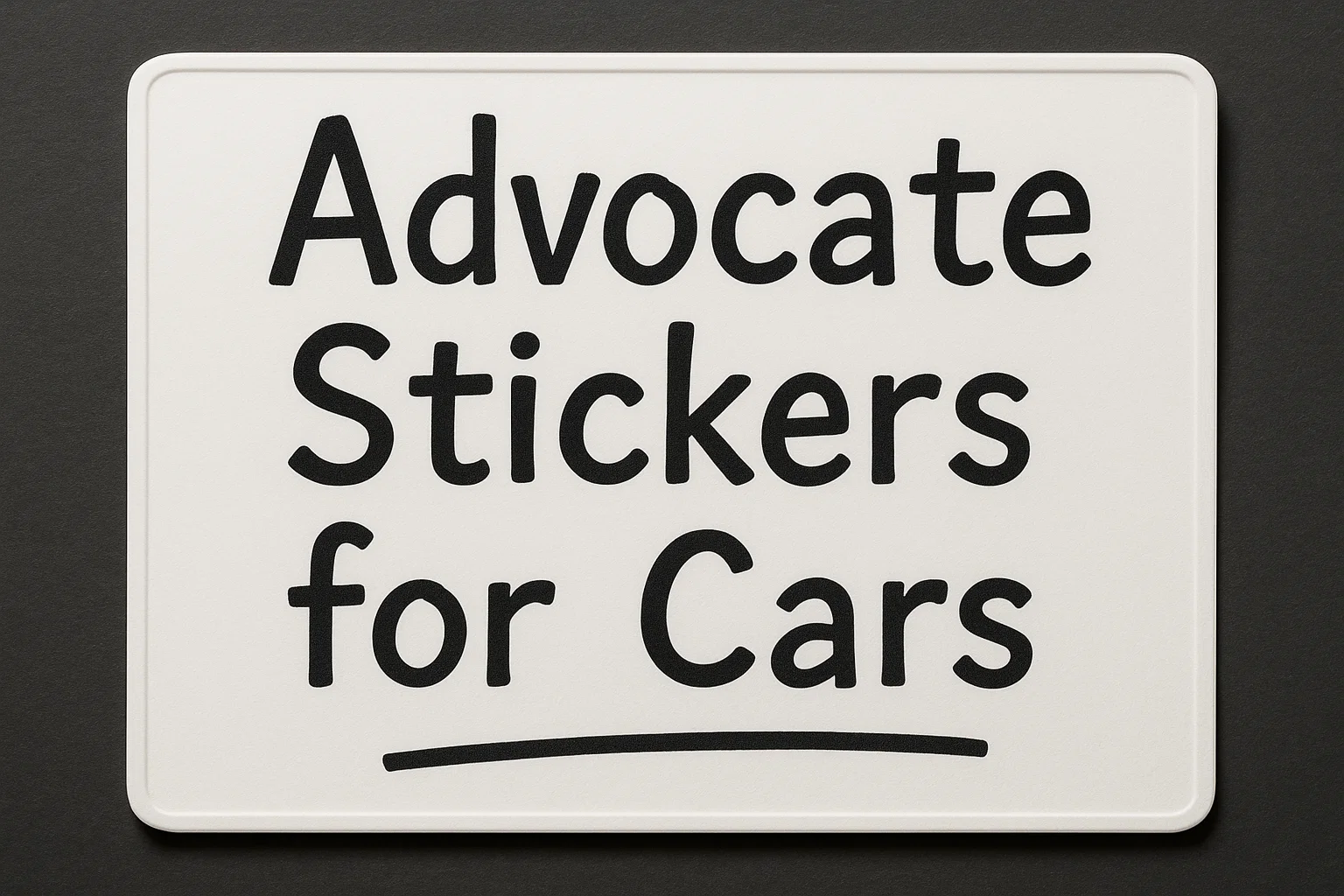This blog is written by Adv. Dhriti Mehra
Table of Contents
ToggleIntroduction
When a speeding vehicle runs a red light, traffic cops nod to the driver instead of stopping them; a tiny “Advocate” sticker shines on the windshield. Are these stickers merely identifying markers or are they a symbol of privilege?
Advocate stickers on cars have long been a source of controversy in India, where they raise concerns about privilege, abuse, and compliance with traffic laws. These stickers, which are intended to identify practising advocates and grant specific benefits, have drawn criticism since they frequently enable people to break traffic regulations without being held accountable.
What Are Advocate Stickers?
They are adhesive labels provided by the Bar Council of India or the relevant state bar councils and are typically distributed to practising advocates. An advocate sticker’s primary goal is to identify and recognise legal experts while also providing them with some benefits.
How They Started?- The Historical Context
Advocate stickers were developed as a practical tool to help courts and legal institutions identify practising lawyers and grant them access to courts. With an increasing number of advocates visiting the court every day in India, regulating parking and entry became challenging, leading state bar councils to issue stickers to simplify identification and facilitate parking at courthouses. They were never intended to grant any legal privileges on roads, but rather to serve as administrative tools for court staff and law enforcement to quickly identify legal professionals. Over time, however, some began to regard them as status symbols, resulting in misuse and misconceptions that they provided exemption from traffic rules.
Intended Benefits
Having an advocate sticker on a car is supposed to have the following primary advantages:
· Many Courts have limited parking spots. Advocates can enter courtrooms and fulfil their legal obligations more easily if they have an advocate sticker, which allows them to park in places intended for legal professionals.
· Legal professionals are clearly distinguished by their advocate stickers. It allows law enforcement and court officials to quickly identify advocates, resulting in simpler access and entry into courtrooms and other restricted areas.
· Professional Recognition: Placing an advocate sticker on a car indicates that the owner is a lawyer, which may improve their reputation among peers and clients.
Though the stickers give some benefits, they are administrative artefacts and not based on statutory law.
Legal Framework
There is no statutory authorisation for the use of advocate stickers on vehicles. Neither the Motor Vehicles Act, 1988, the Advocates Act, 1961, nor any other statute grants advocates any legal exemption or special privilege to display such stickers.
Under traffic law, Section 177 of the Motor Vehicles Act, 1988 functions as a general penal clause, providing that any act in contravention of the Act or its rules, for which no specific penalty is prescribed, may attract a fine. According to this clause, anyone who violates any of the Act’s provisions or any rules, regulations, or notifications issued under it faces a fine. Advocate stickers may be punished under this if used improperly or by those not entitled to them.
The Central Motor Vehicles Rules, 1989, further restrict unauthorised additions to a vehicle, such as stickers that may mislead officials or convey a false sense of authority. Although advocate stickers are not explicitly mentioned, the legislative intent is clear: misuse or misrepresentation through such markings can be penalised. In particular, Rule 50 and Rule 51 of the Rules regulate number plates and expressly prohibit the use of unauthorised emblems or markings.
From a professional conduct perspective, Section 35 of the Advocates Act, 1961, empowers State Bar Councils to initiate disciplinary proceedings against an advocate who engages in misconduct or misrepresentation. Such proceedings can only be commenced when there is “reason to believe” that an offence has been committed. The possible consequences include reprimand, suspension, or even removal from the rolls of advocates. “The Supreme Court has affirmed that misconduct by an advocate even outside the courtroom may amount to professional misconduct if it undermines the dignity of the profession.”
Court Rulings
The Madras High Court ruled on July 2, 2024, in S. Devadoss Gandhi Wilson v. State of Tamil Nadu, that police are completely empowered to act against the misuse of advocate stickers on privately owned vehicles, especially when used to avoid traffic regulations. The court stated, “Take action from today. Tell officers not to fear anything.” “The police need not be afraid to take action against misuse of advocate stickers. Such stickers do not grant immunity from the law.” The Court reminded that even the Supreme Court of India has passed orders discouraging the use of misleading stickers or symbols on private vehicles.
Chennai Traffic Police Enforcement in May 2024 issued advisories banning unauthorised stickers like “Advocate,” “Doctor,” or “Press” on private vehicles, highlighting misuse by impersonators for improper advantage.
These developments reflect a broader push for stricter enforcement and demonstrate the judiciary’s and police’s commitment to ensuring that no one, regardless of profession, is above the law. As authorities continue to crack down on unauthorised use, advocates and other professionals are reminded to use such stickers responsibly and for the intended purpose.
Why Unauthorised Use of Advocate Stickers is Problematic
Displaying advocate stickers without proper authorisation is deception, as it may mislead both the public and law enforcement. Such abuse fosters a false sense of privilege, giving the image of being “above the law” while eroding the notion of equality before the law. The courts have frequently stated that these stickers do not relieve anyone from traffic or other legal requirements.
Beyond the legal aspect, advocates have an ethical duty to uphold justice and the rule of law in both professional and personal conduct, and using such stickers to evade regulatory breaches, this responsibility. Misuse also harms public perception, fostering cynicism about fairness, damaging the profession’s image, and eroding trust in the justice system. Upholding integrity at all times is therefore essential to preserving the honour of the profession and the confidence society places in it.
Solutions For Responsible Use
To prevent the misuse of advocate stickers, courts and bar councils can implement modern solutions such as electronic ID cards or RFID-enabled vehicle passes. Digitisation, with verification and real-time authentication via digital databases, would instantly authenticate credentials, prevent impersonation, and restrict access to authorised advocates. These changes will improve transparency, accountability, and integrity while modernising court access.
However, inconsistent enforcement across states creates ambiguity and undermines prevention efforts. A uniform policy by the central and state governments is required to standardise the issuing, display, and use of advocate identification, assuring professional discipline and proper use of the stickers.
Conclusion
Advocate stickers serve as simple identifiers rather than legal shields. Courts and law enforcement have consistently made it clear that misuse of these stickers can attract penalties, and no professional status exempts anyone from following traffic laws. While these stickers represent professional pride, they only signify identity and not immunity. The Motor Vehicles Act, Section 177, prohibits the unauthorised use of vehicle stickers. However, enforcement differs by state; some levy fines for infractions, while others are permissive, permitting misuse without consequence.
As a result of this discrepancy, several professionals, such as advocates, doctors, police, and journalists, have periodically broken traffic laws with minimal consequences. This raises important questions about equality before the law, as all citizens must adhere to the same regulations regardless of occupation or social standing. Upholding this principle means ensuring everyone is held accountable for their conduct on the roads. Thus, Advocate stickers should be used responsibly and only when legitimately authorised. The rule of law applies equally to all, and respect for traffic regulations is essential to maintaining fairness and safety on our roads.







